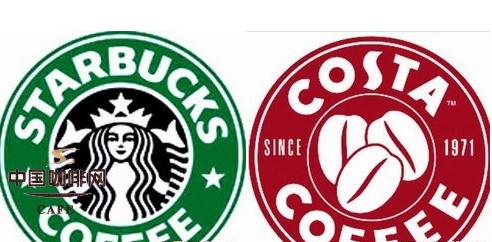The operation mode of Starbucks and Costa's "war" coffee chain

Ka Shijia
Competition
Starbucks
Some data show that according to the international average, the potential consumption expenditure of the coffee market in mainland China is about 1 trillion yuan per year, but the annual coffee sales are only 70 billion yuan at present. In the face of such a big undivided "cake", coffee brands are expanding rapidly, with Starbucks and Costa Coffee fighting among the fiercest. This year, Ka Shijia entered Shenyang and continued to "fight personally" with Starbucks, and a "war" in a coffee cup is inevitable.
Two giants scramble for points of "cake"
Costa represents English coffee, while Starbucks represents American coffee. Starbucks opened its first store on King's Road in London in 1998 and quickly put Costa at a disadvantage. But in 2009, Kashijia successfully reversed its trading and became the largest coffee chain in the UK.
On July 2, 2011, Ka Shijia officially opened its 100th store in China at Terminal T3 of Beijing Capital International Airport. CEO Andy Harrison of Whitbread Group, the parent company of Costa, specially went to Beijing to launch a campaign and announced that it would open more than 100 more stores in China in 2012. Paul Smith, president of Kashijia Asia, even declared that China's coffee chain market would reach 2500 stores by 2018, while Costa vowed to take away 1x3 market share of China's coffee chain market.
Because of this, Shenyang has also become one of the places where Costa expands. It is understood that in 2011, Shenyang opened two Kashijia stores: the first Kashijia store in Shenyang opened in Dayue City on April 28, 2011, and officially opened on December 9. For Starbucks, which already has seven stores in Shenyang, Costa has nothing to fear, but its potential to compete for the market should not be underestimated.
Shenyang continues to fight with each other.
Liu Xianbin, manager of Costa Meimei Store, said: "in Shenyang and even the whole northeast, there is a lack of understanding of coffee culture, and many people do not accept it. Some say it is not good for their health, and some say they can't sleep while drinking coffee. In fact, coffee not only helps digestion, but also improves metabolism, which is of great benefit to the body. " Restricted by the concept of consumption, coffee culture has not become the mainstream, has not yet formed a "personal struggle" fierce battle.
However, with the rapid expansion of Costa, it is not ruled out that this competitive model will be replicated in Shenyang. According to the analysis of industry insiders, in the current Chinese market, Costa has adopted a "personal" strategy, and almost every store is close to Starbucks. In the more mature commercial cities such as Beijing and Shanghai, we will see an interesting phenomenon. Where there is Starbucks, there is a caf é family, forming the trend of "personal struggle".
This is similar to the struggle between KFC and McDonald's. Although Kashika, which only entered the Chinese market in 2006, is seven years later than Starbucks, it has to be said that it may pose a real threat to Starbucks.
Consumers pay more attention to taste
In the face of Costa's close following, Starbucks is obviously not satisfied with only comparing the number of spelling stores with its competitors. As early as 2010, Starbucks announced that it would invest in coffee farms to keep raw materials in its own hands and avoid being controlled by others, thus ensuring the stability of the entire industry chain, which is also a key move for Starbucks.
But for consumers, the choice depends entirely on their own taste. "Costa coffee beans are lightly roasted, light and complete, while Starbucks coffee beans are deeply roasted, bitter and thick, and the overall taste of Starbucks is sweeter than that of Cosco." Ms. Wang, a consumer who has a lot of research on coffee, said that now Starbucks has also raised its prices and does not have an advantage in price.
However, Starbucks, which has just experienced price increases, does not feel threatened by this. Starbucks related sources said that in the future, there will only be more and more coffee shops in China. If they want to occupy the market, it is not only because of market differences, but also to cater to the consumption habits of the local people. "after the price does not have an advantage, we pay more attention to the improvement of the environment and services. Many people come to drink coffee for the good of the environment."
How will the cake in China's coffee market be divided? What will happen to the "war" between Starbucks and Costa? Everything is still unknown, but I have to say that healthy competition will ultimately benefit coffee-loving consumers.
Important Notice :
前街咖啡 FrontStreet Coffee has moved to new addredd:
FrontStreet Coffee Address: 315,Donghua East Road,GuangZhou
Tel:020 38364473
- Prev

The coffee culture in Shanghai is multicultural and creative.
In the history of more than 160 years since Shanghai opened its port, there have been some famous old cafes. Among them, the ruins of the public coffee cafe, located on Duolun Road, Hongkou District, is a historical landmark where Mr. Lu Xun attended the youth gathering of the left-wing Writers' Union in the late 1920s. Since then, cafes in Shanghai have been associated with progressive literature. After more than 80 years, coffee culture has sprung up again in Shanghai. Coffee
- Next

Analysis of China's Coffee Import and Export in 2011
China Business Intelligence Network News: the import of coffee in China is on the rise. According to the China Business Intelligence Network, in 2011, China imported 43000 tons of coffee, an increase of 41.9% over the same period last year. The import volume exceeded the US $100 million mark, reaching US $130 million, an increase of 84.4% over the same period last year. In 2011, China exported a total of 37900 tons of coffee, an increase of 15.2% over the same period last year, and the export value reached 180 million US dollars, compared with the same period last year.
Related
- What documents do you need to go through to open a coffee shop? coffee shop coffee shop certificate processing process
- How to purchase Coffee beans in small Cafe how to choose a suitable supplier for domestic Coffee supply Company
- How to drink Starbucks Fragrance White Coffee? how to make Australian White Coffee? what Italian coffee beans are recommended?
- The Story of Flora Coffee: the name of Flora Coffee Bean and the implication of the Flowers on Florna Coffee
- How much does a cup of coffee cost? How much is the profit of a cup of coffee? What is the profit of the coffee shop in a year?
- Yunnan small Coffee, known as "fragrant Coffee", introduces the characteristics of Alpine Arabica Coffee producing areas in Yunnan, China
- 2023 latest Starbucks full menu price list how much is a cup of Starbucks coffee what is better to drink the most popular hot and cold drinks recommended
- Starbucks different kinds of Coffee Price list Starbucks menu 2023 Top Ten Best drinks in Starbucks
- Starbucks Spring praise Comprehensive matching Coffee Bean theme Story Packaging implication and taste description
- The cost of a cup of coffee latte American coffee cost price and selling price

